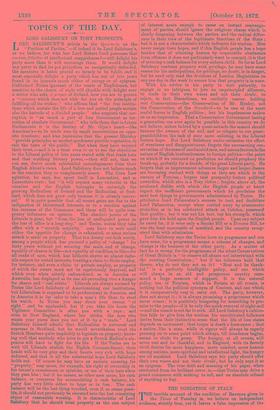TOPICS OF THE DAY.
LORD SALISBURY ON TORY PROSPECTS. of interest acute enough to cause an instant rearrange- ment of parties, should ignore the religious chasm which is slowly deepening between the parties, and the radical differ- ence in their view of the legitimate functions of the State ; but it is not a characteristic which indicates his wisdom. MOD never resign their hopes, and if this English people has a hope besides that of attaining heaven by respectable abstinence from offences it does not particularly want to commit, it is that of securing a cash balance for every unborn child. So far as Lord Salisbury confuses property with privilege, he may have some reason for his anticipations, for privilege, no doubt, is in danger,. but he need only read the decisions of London Magistrates on any one day in the week to assure him that property is in none.
With his advice to his party to wait patiently, to- engage in no intrigues, to join no unprincipled alliances,. to trade in their own wares and not their rivals', to reject, in fact, Disraelisms, we cordially concur, holding real Conservatism—the Conservatism of Mr. Henley, not the Conservatism of the Standard—to be one of the most, useful forces in English politics ; but his hopelessness makes on us no impression. That a Conservative Government lasting a generation can ever again be possible in this country we do not believe, unless indeed by a quasi-miracle the masses should' become the owners of the soil, and so relegate to our great- grandchildren the task of once more enlisting in the Liberal forlorn hope. But Lord Salisbury under-estimates the effect of weariness and disappointment, forgets the unreasoning con- servatism of the mass of uneducated men, and misunderstands the nature of English inattentiveness to foreign politics—the point on which if we ventured on prediction we should prophecy the break-up, probably for a decade, of the great Liberal party. He forgets that as improvement advances larger and larger classes. are becoming content with things as they are, which is the essence of Toryism ; forgets that prosperity fosters political cowardice, which also is a Tory virtue ; forgets, above all, the profound dislike with which the English people at heart regard the inefficient governments which he proclaims the next best things to governments administered by Tories. He attributes Lord Palmerston's success to tact, and doubtless Lord Palmerston, except when carried away by aristocratic prejudice, as in his celebrated attack on Cobden, possessed that quality ; but it was not his tact, but his strength, which gave him his hold upon the English people. Upon any subject he cared for, if it were only a Smoke Bill or a Divorce Bill, he was the least squeezable of mankind, and 'the country recog- nised that with admiration.
Lord Salisbury says the Tories have no programme and can have none, for a programme means a scheme of changes, and change is the business of the other party. As a matter of fact he is wrong, for the programme of the silent Conservatives of Great Britain is "to remove all abuses not intertwined with the existing Constitution ; " but if his followers hold that theory, why do not they act on it V "Rest and be thank- ful" is a perfectly intelligible policy, and one which will always in an old and prosperous country com- mand a large measure of support. It is the natural policy, too, of Toryism, which in Britain at all events, is nothing but the political synonym of Content, and one which it is comparatively easy to carry out. The party, however, does not accept it ; it is always promising a programme which never comes ; it is positively hungering for something to pro- mise to the people—if it be only the quick removal of night-soil —and the reason is not far to seek. All Lord Salisbury's cultiva- tion fails to give him the wisdom his uncultivated followers derive from their instinctive sense that the life of free states depends on movement ; that torpor is death's forerunner ; that a nation, like a man, while in vigour will always be eagerly pressing on to some point which always, till decadence begins, seems to elude its grasp. The hungry, at all events, will never rest and be thankful, and in England, with its fiercely vivid desires for more happiness, more comfort, more honour among nations, more spiritual and intellectual light, the hungry are all mankind. Lord Salisbury says his party should offer their own wares and not their rivals', but he only says it as an epigram. The true drift and meaning of his paper, when extricated from its brilliant cover, is,—that Tories may drive a grand commerce with nothing to sell, and an absolute refusal of anything to buy.


































 Previous page
Previous page